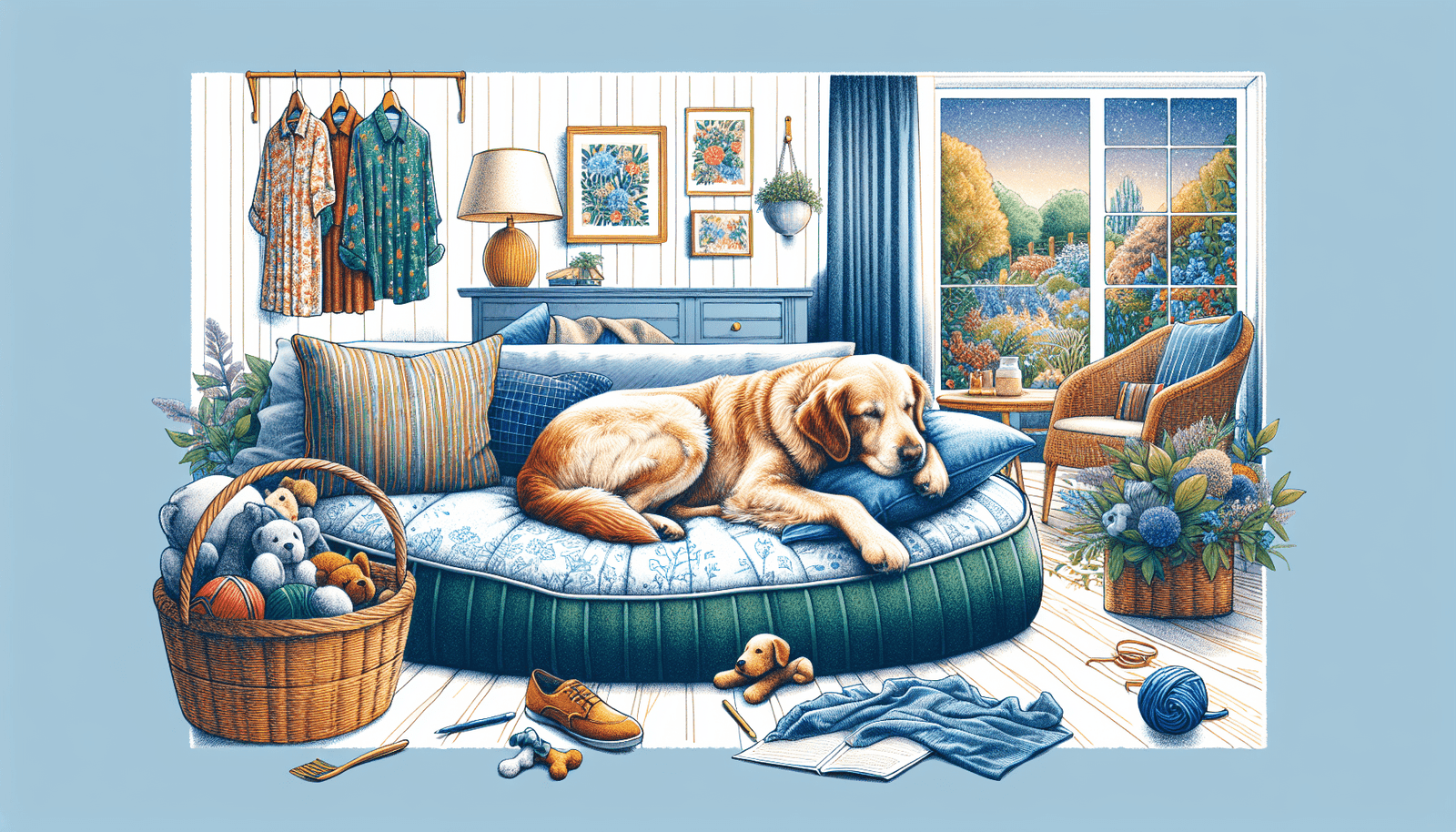
How Can I Help My Dog with Separation Anxiety?” is an insightful guide designed to support you and your furry friend in navigating the challenges of separation anxiety. This article delves into various strategies and solutions, such as natural dog remedies, canine wellness supplements, and effective behavioral techniques. You’ll learn about the importance of maintaining your dog’s overall health and well-being through diet, essential nutrients, and veterinary advice. By exploring popular supplements like glucosamine, omega-3 fatty acids, and probiotics, you’ll be well-equipped to ensure your dog’s mental and physical health are in harmony, paving the way for a happier and calmer canine companion. Have you ever found yourself feeling overwhelmed with concern, wondering how you can help your dog with separation anxiety? If so, rest assured you’re not alone. Many dog owners face the same challenge, and the good news is there are several effective strategies to help your furry friend feel more at peace when left alone. Let’s dive into what separation anxiety is, how you can recognize it, and most importantly, what steps you can take to alleviate your dog’s distress.
Understanding Separation Anxiety in Dogs
What is Separation Anxiety?
Separation anxiety is a condition in which dogs experience extreme stress and nervousness when separated from their owners. This anxiety can manifest in several ways, ranging from mild to severe symptoms. Understanding and identifying these symptoms can help you provide the appropriate support for your dog.
Common Symptoms of Separation Anxiety
Dogs with separation anxiety often exhibit behaviors such as:
- Excessive Barking or Howling: Your dog may bark or howl persistently when left alone.
- Destructive Behavior: Chewing, digging, or scratching at doors and windows in an attempt to escape.
- Pacing: Repeated pacing in a fixed pattern, often around entry points like doors and windows.
- House Soiling: Urinating or defecating indoors despite being house-trained.
- Drooling or Panting: Excessive salivation or heavy panting due to stress.
- Attempts to Escape: Trying to break out of their crate or the house.
Recognizing these signs can alert you to the possibility that your dog is experiencing separation anxiety and needs your help.
Initial Steps to Help Your Dog
Speak to Your Veterinarian
Before embarking on any treatment or changes, it’s essential to consult with a veterinarian. This ensures that the behavior isn’t due to other underlying health issues. Your vet can offer guidance and may suggest specific treatments or behavioral training techniques tailored to your dog’s individual needs.
Create a Safe Space
Designating a safe, comfortable area for your dog while you’re away can provide a sense of security.
- Crate Training: Crates can be comforting dens for dogs. Make sure it’s a welcoming space with soft bedding and familiar toys.
- Calm Environment: Use calming music or a white noise machine to create a soothing atmosphere.
- Comfort Items: Leave a piece of your clothing in their safe space to provide a familiar scent.
Behavioral Modification Techniques
Gradual Desensitization
Gradual desensitization aims to reduce your dog’s anxiety by slowly getting them used to being alone.
- Short Departures: Start with very short periods of separation, gradually increasing the time you’re away.
- Consistent Routine: Stick to a specific routine when leaving and returning to minimize stress.
- Positive Reinforcement: Reward your dog with treats and praise for calm behavior during departures and returns.
Training Exercises
Teaching specific commands can help your dog manage their anxiety better.
- “Stay” Command: Train your dog to stay in a designated area for gradually increasing periods.
- Independence Training: Encourage independent play and resting away from you, so your dog becomes more comfortable being alone.
Mental and Physical Stimulation
Ensuring your dog is well-exercised and mentally stimulated can significantly reduce anxiety.
- Regular Exercise: Daily walks, runs, or play sessions can tire your dog out, making them less prone to anxiety.
- Interactive Toys: Puzzles and treat-dispensing toys can keep your dog occupied and mentally engaged while you’re away.
Utilizing Supplements and Products
Natural Remedies for Dogs
Natural supplements can be a gentle way to support your dog’s emotional well-being.
| Supplement | Benefits |
|---|---|
| Valerian Root | Calming herb often used to alleviate anxiety symptoms. |
| Chamomile | Known for its soothing properties, helpful for anxious dogs. |
| Lavender | Aromatherapy option that can promote a sense of calm. |
| St. John’s Wort | Used for its mood-stabilizing effects. |
Canine Wellness Supplements
Supplements tailored for overall canine health can also address certain aspects of anxiety.
| Supplement | Benefits |
|---|---|
| Omega-3 Fatty Acids | Supports brain health, which may help reduce anxiety. |
| Glucosamine and Chondroitin | Supports joint health, ensuring your dog remains physically active and less stressed. |
| Probiotics | Maintain gut health, which can impact overall mood and anxiety levels. |
Dog Vitamins and Supplements
Proper nutrition plays a crucial role in your dog’s health and well-being.
| Vitamin/Supplement | Benefits |
|---|---|
| B-Vitamins | Boost energy and maintain a healthy nervous system. |
| Antioxidants | Support immune function and reduce inflammation. |
| Multivitamins | Provide a balanced intake of essential nutrients. |
Specific Health Products
Dog Health Products
Various health products can support your dog’s physical comfort and overall well-being, contributing to reduced anxiety.
| Product | Benefits |
|---|---|
| Dental Chews | Maintain oral health, preventing discomfort that can exacerbate anxiety. |
| Joint Supplements | For senior dogs or breeds prone to joint issues, these can reduce pain and improve mobility. |
Dietary Considerations
Balanced Diet
A complete and balanced diet is vital for maintaining your dog’s health.
- Quality Dog Food: Ensure the food meets AAFCO standards for balanced nutrition.
- Specific Diets: Consider specific diets for dogs with allergies or other health concerns that could contribute to anxiety.
Support Through Diet
Certain dietary components can support your dog’s mental health.
- Proteins and Amino Acids: These are crucial for producing neurotransmitters that regulate mood.
- Omega-3 Fatty Acids: Found in fish oils, these support cognitive function and may reduce anxiety.
When to Seek Professional Help
Training Specialists
If your dog’s anxiety is severe, professional trainers with experience in behavioral modification can offer personalized strategies.
Veterinary Behaviorists
Veterinary behaviorists specialize in diagnosing and treating behavioral issues, including severe separation anxiety. They can provide more advanced treatment options, including medication if necessary.
Preventing Separation Anxiety in Puppies and Young Dogs
Early Training
Early training can help prevent the development of separation anxiety.
- Crate Training: Start crate training early to make the crate a positive and comfortable space.
- Alone Time: Gradually increase the time your puppy spends alone, reinforcing calm and independent behavior from a young age.
Socialization
Proper socialization can reduce anxiety and promote a well-rounded temperament.
- Positive Experiences: Expose your puppy to various environments, people, and other animals in a controlled and positive manner.
- Training Classes: Enroll in puppy training classes to promote good behavior and confidence.
Keeping Senior Dogs Comfortable
Special Considerations for Older Dogs
Older dogs may have different needs when it comes to managing anxiety.
- Joint Health: Ensure your senior dog receives proper joint supplements to maintain mobility and comfort.
- Routine Health Checks: Regular vet visits to monitor overall health can help address any contributing factors to anxiety.
- Comfort Items: Provide orthopedic beds or heated pads to ease physical discomfort that could worsen anxiety.
Appropriate Supplements for Senior Dogs
Supplements specifically designed for senior dogs can support their unique health needs.
| Supplement | Benefits |
|---|---|
| Senior Multivitamins | Tailored to the nutritional needs of older dogs. |
| Joint Support Supplements | Maintain healthy cartilage and ease joint pain. |
| Antioxidants | Support cellular health and reduce inflammation. |
Conclusion
Helping your dog with separation anxiety requires a multifaceted approach. By combining behavioral training, environmental adjustments, proper nutrition, and the use of supplements and health products, you can significantly improve your dog’s quality of life. Always remember to consult with a veterinarian before introducing new treatments or supplements to ensure they are safe and appropriate for your specific dog.
Being patient and consistent with your efforts will pay off as you help your furry friend feel more secure and comfortable when you’re not around. Your dog is a cherished member of your family, and your dedication to their well-being will not go unnoticed. Together, you can overcome the challenges of separation anxiety and enjoy a happier, healthier life.







